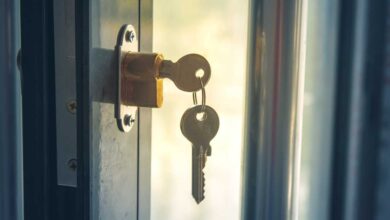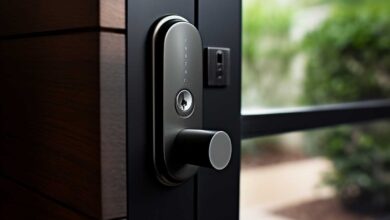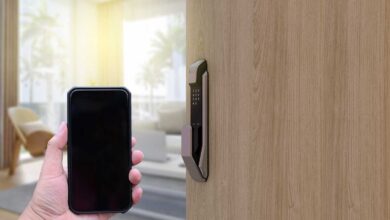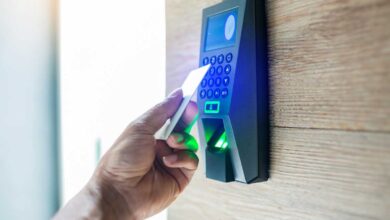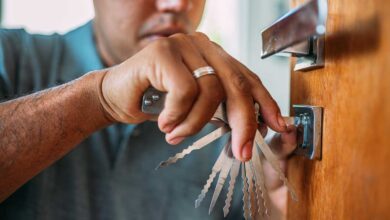Level Up Your Home Security: Upgrading Your Home Security With High-Security Locks
KEY TAKEAWAYS
In today’s rapidly evolving world, security has become a paramount concern for homeowners and businesses alike. With advancements in technology, the demand for high-security locks has surged, and for good reason. These locks offer a plethora of benefits that can significantly enhance the safety of your premises.
Let’s delve into the intricacies of high-security locks and understand their unmatched significance. Explore the importance of upgrading your home security with high-security locks. Dive deep into their advanced features, the rigorous BHMA/ANSI standards, and understand why they are a paramount choice for homeowners and businesses.
The Anatomy Of High-Security Locks
High-security locks are not just about a robust build. They encompass intricate mechanisms that deter even the most seasoned burglars. Here’s what sets them apart:
Complex Pin Configurations
Traditional locks often have simple pin configurations, making them susceptible to picking. High-security locks, on the other hand, feature complex pin setups, making unauthorized access nearly impossible.
Drill Resistance
Crafted with hardened steel inserts, these locks resist drilling attempts. The presence of anti-drill plates further ensures that breaking in becomes a Herculean task.
Key Control
Duplication of keys for high-security locks is not a walk in the park. Specialized key profiles and patented keyways ensure that unauthorized key duplication is a thing of the past.
Benefits Of Installing High-Security Locks
Beyond their intricate build, high-security locks offer tangible benefits that can make a world of difference:
Enhanced Security
The primary advantage is, of course, heightened security. With their advanced mechanisms, these locks provide an added layer of protection against break-ins.
Longevity
High-security locks are built to last. Their durability ensures that you won’t need frequent replacements, offering value for money in the long run.
Peace Of Mind
Knowing that your premises are secured with the best locks in the industry can offer unparalleled peace of mind. It’s an investment in safety that pays off in tranquility.
Selecting The Right High-Security Lock
With a myriad of options available, choosing the right high-security lock can be daunting. Here are some pointers to guide your decision:
Certifications
Always opt for locks that have been certified by recognized institutions. Certifications are a testament to the lock’s quality and reliability.
Brand Reputation
Reputed brands have a track record of delivering quality. Researching and opting for well-known brands can save you from potential security breaches.
Professional Consultation
Engaging with security professionals can provide insights tailored to your specific needs. Their expertise can guide you to the perfect lock for your premises.
The Anatomy Of High-Security Locks
High-security locks are not just about a robust build. They encompass intricate mechanisms that deter even the most seasoned burglars. Here’s what sets them apart:
Complex Pin Configurations
Traditional locks often have simple pin configurations, making them susceptible to picking. High-security locks, on the other hand, feature complex pin setups, making unauthorized access nearly impossible.
Drill Resistance
Crafted with hardened steel inserts, these locks resist drilling attempts. The presence of anti-drill plates further ensures that breaking in becomes a Herculean task.
Key Control
Duplication of keys for high-security locks is not a walk in the park. Specialized key profiles and patented keyways ensure that unauthorized key duplication is a thing of the past.
Types Of High-Security Locks
Understanding the variety of high-security locks available is crucial to making an informed decision:
Bump Key
A bump key is a specially crafted key that can be used to open pin tumbler locks. While it’s a security concern for standard locks, high-security locks are designed to resist bumping.
Standard Lock
This is the most common type of lock, often found in residential properties. While they provide basic security, they are vulnerable to picking, bumping, and drilling.
Cylinder Lock
Cylinder locks offer a higher level of security than standard locks. They use a cylinder mechanism, making them harder to pick. However, without added security features, they can still be vulnerable.
Traditional Lock
Traditional locks are the predecessors to modern high-security locks. They rely on a basic mechanism and are more susceptible to security breaches.
True High-Security Lock
These locks are the pinnacle of security. They incorporate multiple security features like security pins, anti-drill plates, and complex keyways to deter unauthorized access.
Security Pin And Plastic Components
High-security locks often use security pins that are designed to bind in a specific way, making picking extremely difficult. Some also use plastic components to further complicate lock picking.
Security Key And Pin Stacks
These locks use a combination of security keys and pin stacks to provide an added layer of protection. The key interacts with the pin stacks in a unique way, making unauthorized access challenging.
Anti-Drill Plates
As the name suggests, these plates are added to high-security locks to prevent drilling. Made of hardened steel, they ensure that drilling the lock is next to impossible.
Special Tools And Extra Protection
High-security locks often require specialized tools for installation and maintenance. These tools, combined with features like anti-drill plates and security pins, offer unparalleled protection.
Installation Of High-Security Locks
Installation of high-security locks is a critical step in safeguarding your home or business from potential threats. High-security locks offer a higher level of protection compared to standard locks, thanks to their complex designs and mechanisms which make them resistant to picking, drilling, and other common forms of lock manipulation.
Professional Locksmiths Or DIY Installation?
While some may be tempted to install these locks themselves, it’s recommended to engage with professional locksmiths. Their expertise ensures that the lock is installed correctly, maximizing its security potential.
Level Of Protection Provided By Different Types Of Locks
While all locks provide a level of protection, it’s essential to understand the varying degrees:
-
Standard And Traditional Locks: Basic protection, vulnerable to picking and bumping.
-
Cylinder Locks: Enhanced protection but can be compromised without added security features.
-
True High-Security Locks: The highest level of protection, resistant to all common forms of unauthorized access.
The Anatomy Of High-Security Locks
High-security locks are not just about a robust build. They encompass intricate mechanisms that deter even the most seasoned burglars. Here’s what sets them apart:
Complex Pin Configurations
Traditional locks often have simple pin configurations, making them susceptible to picking. High-security locks, on the other hand, feature complex pin setups, making unauthorized access nearly impossible.
Drill Resistance
Crafted with hardened steel inserts, these locks resist drilling attempts. The presence of anti-drill plates further ensures that breaking in becomes a Herculean task.
Key Control
Duplication of keys for high-security locks is not a walk in the park. Specialized key profiles and patented keyways ensure that unauthorized key duplication is a thing
High-Security Locks And the BHMA/ANSI Standard
The Builders Hardware Manufacturers Association (BHMA) and the American National Standards Institute (ANSI) have set rigorous standards for locks to ensure their quality and durability. High-security locks that meet the BHMA/ANSI standards have undergone stringent testing for security, durability, and finish. These standards ensure that the locks can withstand tampering attempts, have a long operational life, and maintain their appearance over time.
Testing And Certification
High-security locks that adhere to BHMA/ANSI standards undergo a series of tests to evaluate their performance. These tests assess the lock’s resistance to forced entry, picking, drilling, and other forms of tampering. Additionally, the locks are tested for their operational lifespan and ability to withstand environmental factors such as corrosion. Locks that pass these tests are awarded a certification, indicating their compliance with the highest security standards.
Are High-Security Locks Worth It?
Absolutely. The benefits of high-security locks extend beyond their robust construction and resistance to tampering.
Insurance Benefits
Many insurance companies offer discounts on premiums for properties equipped with high-security locks. These locks reduce the risk of break-ins, leading to fewer claims and ultimately saving you money.
Property Value
Installing high-security locks can increase the value of your property. Prospective buyers often prioritize security, and having certified locks in place can make your property more attractive.
What Makes A High-Security Lock Different?
High-security locks stand out from standard locks due to their advanced features and adherence to stringent standards.
Patented Keyways
One distinguishing feature of high-security locks is their patented keyways. These unique designs prevent unauthorized key duplication, as only authorized locksmiths can create copies.
Multi-Point Locking Systems
Some high-security locks feature multi-point locking systems, where the lock engages at multiple points within the door frame. This design provides enhanced resistance to forced entry.
What Are The Best High-Security Door Locks?
While several brands and models excel in the realm of high-security locks, some consistently receive accolades for their performance:
-
Medeco: Known for its resistance to picking, drilling, and bumping, Medeco locks also feature keys that can only be duplicated by authorized dealers.
-
Mul-T-Lock: Renowned for its advanced key control systems, Mul-T-Lock offers a wide range of high-security solutions, including deadbolts, padlocks, and electronic locks.
-
ASSA Abloy: Offers a wide range of high-security solutions with robust features, including patented keyways and multi-point locking systems.
-
Schlage Primus: Combines advanced key control with high resistance to physical attacks. Schlage Primus locks are often used in commercial settings due to their reliability and durability.
It’s essential to research and consult with security professionals to determine the best fit for your specific needs.
Frequently Asked Questions
To provide a better understanding of upgrading your home security with high-security locks, we have answered some of the most commonly asked questions.
What are the BHMA/ANSI standards for high-security locks?
The BHMA (Builders Hardware Manufacturers Association) and ANSI (American National Standards Institute) standards are rigorous benchmarks set for locks to ensure their quality, durability, and security. Locks adhering to these standards have undergone extensive testing for resistance against tampering, operational lifespan, and environmental resilience.
Are high-security locks more expensive than standard locks?
Yes, high-security locks typically have a higher initial cost than standard locks due to their advanced features, durable materials, and adherence to strict security standards. However, the long-term benefits, such as enhanced security and potential insurance discounts, often justify the investment.
Can I duplicate keys for high-security locks?
High-security locks often feature patented keyways, which means that their keys can only be duplicated by authorized locksmiths or dealers. This design ensures added security against unauthorized key duplication.
How often do high-security locks need maintenance?
While high-security locks are designed for durability, periodic maintenance by a professional locksmith is recommended to ensure optimal performance and longevity.
Are electronic locks considered high-security?
Electronic locks can be considered high-security if they incorporate advanced security features and meet established security standards. However, it’s essential to evaluate each electronic lock individually based on its features and certifications.
Can high-security locks be installed on any door?
Most high-security locks are versatile and can be installed on a variety of doors. However, it’s crucial to consult with a professional locksmith to ensure the lock is compatible with your door’s material and design.
Upgrading Your Home Security With High-Security Locks
In an era where security threats are ever-present, upgrading your home security with high-security locks is vital. Their advanced features and benefits make them an indispensable tool for anyone serious about safeguarding their property. As technology continues to evolve, one can only expect these locks to become even more sophisticated, offering even greater levels of protection. Investing in high-security locks is not just a decision for today but a forward-thinking move that prepares you for the challenges of tomorrow.
Learn more about how to keep your home and family secure by exploring our comprehensive guide on how home security systems can help prevent burglaries and intrusions. Visit Security Forward to learn more.

